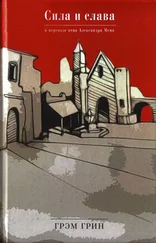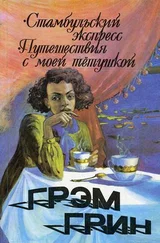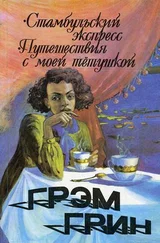Грэм Грин - The Comedians
Здесь есть возможность читать онлайн «Грэм Грин - The Comedians» весь текст электронной книги совершенно бесплатно (целиком полную версию без сокращений). В некоторых случаях можно слушать аудио, скачать через торрент в формате fb2 и присутствует краткое содержание. Год выпуска: 1966, Жанр: Классическая проза, на английском языке. Описание произведения, (предисловие) а так же отзывы посетителей доступны на портале библиотеки ЛибКат.
- Название:The Comedians
- Автор:
- Жанр:
- Год:1966
- ISBN:нет данных
- Рейтинг книги:3 / 5. Голосов: 1
-
Избранное:Добавить в избранное
- Отзывы:
-
Ваша оценка:
- 60
- 1
- 2
- 3
- 4
- 5
The Comedians: краткое содержание, описание и аннотация
Предлагаем к чтению аннотацию, описание, краткое содержание или предисловие (зависит от того, что написал сам автор книги «The Comedians»). Если вы не нашли необходимую информацию о книге — напишите в комментариях, мы постараемся отыскать её.
The Comedians — читать онлайн бесплатно полную книгу (весь текст) целиком
Ниже представлен текст книги, разбитый по страницам. Система сохранения места последней прочитанной страницы, позволяет с удобством читать онлайн бесплатно книгу «The Comedians», без необходимости каждый раз заново искать на чём Вы остановились. Поставьте закладку, и сможете в любой момент перейти на страницу, на которой закончили чтение.
Интервал:
Закладка:
I came to a gate in the fence, which was locked. A negro in a steel helmet and blue dungarees asked my business from the other side of the wire. I told him I had come to see Mr Schuyler Wilson.
'Let me see your pass,' he demanded, and I felt as though I were back where I had come from.
'He expects me.'
The negro went to a hut and I saw him telephoning (I had almost forgotten that telephones worked). Then he opened the gate and gave me a badge which he said I was to wear so long as I was on the mining estate. I could drive as far as the next barrier. I drove a good many miles beside the flat blue Caribbean sea. I passed a small landing-ground with a wind-stocking blowing towards Haiti and then a harbour empty of boats. The red bauxite dust lay everywhere. I came to another barrier closing the road and another negro in a tin hat. He examined my badge and took my name again and my business and telephoned. Then he told me to wait where I was. Someone would come for me. I waited ten minutes.
'Is this the Pentagon,' I asked him, 'or the headquarters of the C.I.A.?' He wouldn't speak to me. He probably had orders not to speak. I was glad he didn't carry a gun. Then a motor-cycle arrived driven by a white man in a tin helmet. He spoke practically no English and I knew no Spanish; he indicated I was to follow his motor-cycle. We drove on for a few kilometres more of red earth and blue sea before we reached the first administrative buildings, rectangular blocks of cement and glass with no one in sight. Further on was a luxurious trailer-park where children played with space-uniforms and space-guns. Women looked out of windows over kitchen-stoves, and there was a smell of cooking. At last before a great glass building we came to a halt. There was a flight of steps wide enough for a parliament and a terrace with lounging-chairs. A large fat man with an anonymous face shaved as smooth as marble stood at the top. He might have been a city mayor waiting to deliver a freedom.
'Mr Brown?'
'Mr Schuyler Wilson?'
He looked at me in a surly way. Perhaps I had pronounced his first name wrong. Perhaps he disliked my sports-car. He said grudgingly, 'Have a coke,' and gestured towards one of the lounging-chairs.
'If you could spare a whisky?'
He said without enthusiasm, 'I'll see what we can do,' and walked into the great glass building leaving me alone. I felt I had chalked up a black mark. Perhaps only visiting directors or leading politicians got whisky. I was only a potential catering manager, seeking a job. However he brought the whisky, carrying a coke in his other hand like a reproach.
'Mr Smith wrote to you about me,' I said. I just stopped myself from saying the Presidential Candidate.
'Yes. Where did you two meet?'
'He stayed at my hotel in Port-au-Prince.'
'That's right.' It was as though he were double-checking the facts to see if one of us had lied. 'You're not a vegetarian?'
'No.'
'Because the boys here like their steak and French fries.' I drank a little of the whisky which was drowned in soda. Mr Schuyler Wilson watched me closely as though he begrudged me every drop. I felt more and more that the job would not come my way.
'What's your experience in catering?'
'Well, I owned this hotel in Haiti until a month ago. I've worked too at the Trocadero in London — ' and I added the ancient lie, 'Fouquet's in Paris.'
'Got any testimonials?'
'I could hardly write my own, could I? I've been my own employer a good many years now.'
'Your Mr Smith's a bit of a crank, isn't he?'
'I like him.'
'Did his wife tell you he ran for president once? On the vegetarian ticket.' Mr Schuyler Wilson laughed. It was an angry laugh without amusement, like the menace of a hidden beast.
'I suppose it was a form of propaganda.'
'I don't like propaganda. We've had leaflets here pushed under the wire. Trying to get at the men. We pay them well. We feed them well. What made you leave Haiti?'
'Trouble with the authorities. I helped an Englishman to escape from Port-au-Prince. The Tontons Macoute were after him.'
'What's the Tontons Macoute?'
We were less than three hundred kilometres from Port-au-Prince; it seemed strange he could ask me that, but I suppose there hadn't been a story for a long time in any newspaper he read.
'The secret police,' I said.
'How did you get out?'
'His friends helped me across the border.' It was a brief enough statement to cover two weeks of fatigue and frustration.
'Who do you mean — his friends?'
'The insurgents.'
'You mean the Communists?' He was cross-examining me as though I had applied for a job as agent in the C.I.A. and not as catering manager for a mining-company. I lost my temper a little. I said, 'Insurgents are not always Communists until you make them so.'
My irritation amused Mr Schuyler Wilson. He smiled for the first time; it was a smile of self-satisfaction as though he had uncovered by adroit questioning something I had wanted to keep secret.
'You're quite an expert,' he said.
'An expert?'
'I mean owning your own hotel, working at that place you mentioned in Paris. I guess you wouldn't be very happy here. Just plain American cooking is all we need.' He got up to show me that the interview was over. I finished my whisky while he watched me with impatience, and then, 'Glad to have met you,' he said without shaking hands, 'give up your badge at the second gate.'
I drove away past the private landing-ground and the private port. I handed over my badge: I was reminded of the entry-permit you leave with immigration at Idlewild.
2
I drove to the Ambassador Hotel on the outskirts of Santo Domingo where Mr Smith was staying. It wasn't the right setting for him, or so it seemed to me. I had become accustomed to the stooping figure, the mild and modest face and the wild white hair, in surroundings of poverty. In this wide glittering hall men sat wearing purses on their belts instead of revolver-holsters, and when they wore dark glasses it was only to save their eyes from the bright light. There was a continuous rattle from the one-armed bandits and you could hear the calls from the croupier in the casino. Everyone had money here, even Mr Smith. Poverty was out of sight, down in the city. A girl in a bikini wearing a gay bathrobe came in from the swimming-pool. She asked at the desk whether a Mr Hochstrudel, Junior, had arrived yet. 'I mean Mr Wilbur K. Hochstrudel.' The clerk said, 'No, but Mr Hochstrudel is expected.'
I sent a message to Mr Smith that I was below and found myself a seat. At the table nearest me the men were drinking rum punches and I thought of Joseph's. He made better ones than they served here, and I missed him.
I had stayed only twenty-four hours with Philipot. He was polite enough to me in a restrained way, but he was a changed man from the one I used to know. I had been a good audience in the past for his Baudelairian verses, but I was too old for war. It was Jones he needed now and Jones's company which he sought. He had nine men with him in his hide-out and to hear him talking to Jones you would have imagined he commanded at least a battalion. Jones very wisely listened and didn't speak much, but once I woke, during the night I spent with them, and heard Jones say, 'You have to establish yourself. Near enough to the frontier for newspapermen to come over. Then you can demand recognition.' Were they really, in this hole among the rocks (and they changed their hole, I learnt, each day) already thinking in terms of a provisional government? They had with them three old tommy-guns from the police station — which had probably seen service first in the days of Al Capone, a couple of first-war rifles, a shotgun, two revolvers, and one man had nothing better than his machete. Jones added like an old hand, 'This kind of war is a bit like a confidence-trick. There was one way we deceived the Japs …' He hadn't found his golf-course, but I really believe he was happy. The men clustered close; they couldn't understand a word he said, but it was as though a leader had come into the camp.
Читать дальшеИнтервал:
Закладка:
Похожие книги на «The Comedians»
Представляем Вашему вниманию похожие книги на «The Comedians» списком для выбора. Мы отобрали схожую по названию и смыслу литературу в надежде предоставить читателям больше вариантов отыскать новые, интересные, ещё непрочитанные произведения.
Обсуждение, отзывы о книге «The Comedians» и просто собственные мнения читателей. Оставьте ваши комментарии, напишите, что Вы думаете о произведении, его смысле или главных героях. Укажите что конкретно понравилось, а что нет, и почему Вы так считаете.



